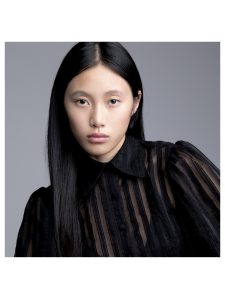AAYP 2017 Youth Ambassadors Scholarship

Garhay Mei
Garhay Hedy Mei. That’s me. Not Gary, not Garfield, not Garbage — my name is Garhay, and I’m proud of it — but this wasn’t always the case. When I was younger, I struggled with my identity as an Asian American. I grew up in a small suburban town in Indiana, and being in the Midwest, I was certainly one of the only Asians, no less with such a unique name. As a child, this name followed me around like a dark winter cloud, with sinister lightning crackling every time I met a different person. I absolutely despised it.
If I could ever go back and tell my younger self one thing it would be this: “Being different is perfectly fine, and it definitely does not make you any less of a person.” I spent too long trying to be someone who I wasn’t in order impress those who were my “friends”. Many adolescents experience the same fear that being different is a one way ticket to losing friends. That’s a weakness I’d like to conquer and defeat. Being unique is the best quality anyone can have, and it takes a lot of strength and power for a person to see that. It takes a leader to not follow the crowd.
Being Asian in a suburban town was hard. I found myself always trying to fit in and become more “American”. I thought that the only way to make myself more like my classmates was to lose the Asian in me. I did it all; from cutting my hair a certain way, to wearing the accepted clothes for a second grader. I was extremely ashamed to be Chinese, and I was ready to do everything in my power to shake the title. I hated the way my eyes were smaller than the other children’s. I hated the way my nose was bigger. I hated how I had non-existent eyebrows. There actually came a time where I grew a sense of hatred towards my parents as well. These people, who sacrificed everything for their little girl, came home to find her ungrateful and unloving. I was becoming the one thing I had always wished to be. I wanted to be American, who fit in and had a lot of friends. In return, I gave up being a filial daughter to my parents.
It’s safe to say that my parents are not your average American Mom and Dad. My Mother and Father, both born and raised in China, clung onto deep Asian ethics. They brought these ethics to America and did their best to embed it in me. One of my earliest memories was when I brought a packed lunch to school. I adored my mom’s cooking, and one night I had enjoyed dinner so much, I asked her to pack the leftovers for me to eat at school. All day during class, I dreamt about eating my lunch. When the time finally came, I was sitting in a cafeteria table with my friends. I eagerly opened my lunch and took in the delicious aroma surrounding it. Immediately, the kids around the table began to protest about the “disgusting” smell that engulfed the atmosphere. My heart dropped, but I ignored the burning sensation in the back of my throat, and quickly masked my feelings with an equally disgusted expression. I acted as if I also did not like the dish, and hurriedly put it away. That day plays an important turning point in my life as I had a choice between eating my mother’s food or appeasing to my peers. I succumbed to the latter.
I was overwhelmed with embarrassment, which quickly turned into anger. I regret ever feeling this way, but the fact that I overcame this makes me a leader. Being a leader isn’t about being the most confident or the most commanding. A leader, to me, is a person that can overcome bad situations and triumph in the end. A leader frees themselves of the obligations of being socially acceptable, and accepts themselves for whoever they are. Acceptance starts from yourself, and I will always accept myself everyday — Asian and all.
